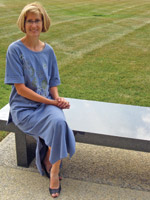Kyle J. Myers - 2014 SPIE Women in Optics Planner
Director, Division of Imaging and Applied Mathematics, Center for Devices and Radiological Health, U.S. Food and Drug Administration, USA
Country of Birth: USA
Educational Background: PhD, MS, Optical Sciences, University of Arizona, USA; BA Mathematics, Physics, Occidental College, USA
 My father was an engineer and always an inspiration to me. The first female PhD I met, Marcia McBeath, was a woman who got her degree at Stanford at the same time as her husband, while raising four young children. She was a great example of making it all work - a career, marriage, and family.
My father was an engineer and always an inspiration to me. The first female PhD I met, Marcia McBeath, was a woman who got her degree at Stanford at the same time as her husband, while raising four young children. She was a great example of making it all work - a career, marriage, and family.
FDA's Center for Devices and Radiological Health promotes and protects public health by assuring the safety and effectiveness of medical devices, including medical imaging systems, image analysis and reconstruction algorithms, medical displays, even computer-aided diagnosis software. I have devoted my career to advancing approaches for evaluation of medical imaging devices from a subjective practice to an objective and quantitative science; my lab develops methods for evaluating novel medical imaging devices and provides independent, objective data regarding device performance. This is a type of lab science that is not done elsewhere. It is extremely rewarding to have a research job that is concretely assisting in getting new medical products to US patients as quickly as possible, based on solid scientific evidence of their benefits.
Remember to focus on the fundamentals! A solid background in mathematics and physics will give you the foundation to address the variety of technical challenges you'll face over a career that will likely span many decades. Be tenacious. Science is hard work, but worth the long hours of homework and lab time. The people you'll meet are interesting and passionate about what they do, which makes being around them so much fun. Not to mention the fact that STEM degrees can put you in a position to make a real difference in the world!